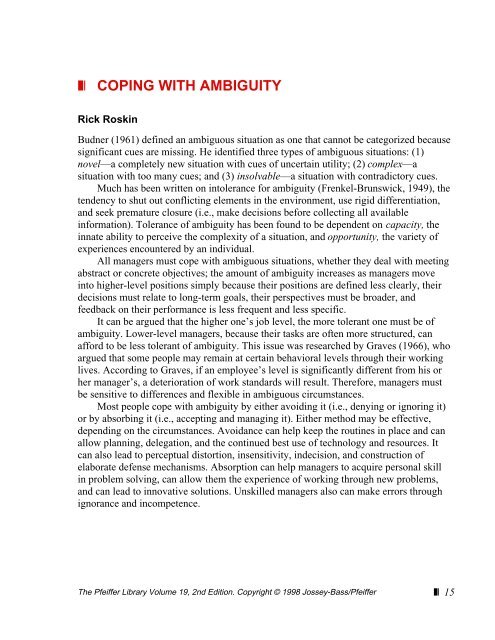motivational analysis of organizations
motivational analysis of organizations
motivational analysis of organizations
You also want an ePaper? Increase the reach of your titles
YUMPU automatically turns print PDFs into web optimized ePapers that Google loves.
❚❘ COPING WITH AMBIGUITY<br />
Rick Roskin<br />
Budner (1961) defined an ambiguous situation as one that cannot be categorized because<br />
significant cues are missing. He identified three types <strong>of</strong> ambiguous situations: (1)<br />
novel—a completely new situation with cues <strong>of</strong> uncertain utility; (2) complex—a<br />
situation with too many cues; and (3) insolvable—a situation with contradictory cues.<br />
Much has been written on intolerance for ambiguity (Frenkel-Brunswick, 1949), the<br />
tendency to shut out conflicting elements in the environment, use rigid differentiation,<br />
and seek premature closure (i.e., make decisions before collecting all available<br />
information). Tolerance <strong>of</strong> ambiguity has been found to be dependent on capacity, the<br />
innate ability to perceive the complexity <strong>of</strong> a situation, and opportunity, the variety <strong>of</strong><br />
experiences encountered by an individual.<br />
All managers must cope with ambiguous situations, whether they deal with meeting<br />
abstract or concrete objectives; the amount <strong>of</strong> ambiguity increases as managers move<br />
into higher-level positions simply because their positions are defined less clearly, their<br />
decisions must relate to long-term goals, their perspectives must be broader, and<br />
feedback on their performance is less frequent and less specific.<br />
It can be argued that the higher one’s job level, the more tolerant one must be <strong>of</strong><br />
ambiguity. Lower-level managers, because their tasks are <strong>of</strong>ten more structured, can<br />
afford to be less tolerant <strong>of</strong> ambiguity. This issue was researched by Graves (1966), who<br />
argued that some people may remain at certain behavioral levels through their working<br />
lives. According to Graves, if an employee’s level is significantly different from his or<br />
her manager’s, a deterioration <strong>of</strong> work standards will result. Therefore, managers must<br />
be sensitive to differences and flexible in ambiguous circumstances.<br />
Most people cope with ambiguity by either avoiding it (i.e., denying or ignoring it)<br />
or by absorbing it (i.e., accepting and managing it). Either method may be effective,<br />
depending on the circumstances. Avoidance can help keep the routines in place and can<br />
allow planning, delegation, and the continued best use <strong>of</strong> technology and resources. It<br />
can also lead to perceptual distortion, insensitivity, indecision, and construction <strong>of</strong><br />
elaborate defense mechanisms. Absorption can help managers to acquire personal skill<br />
in problem solving, can allow them the experience <strong>of</strong> working through new problems,<br />
and can lead to innovative solutions. Unskilled managers also can make errors through<br />
ignorance and incompetence.<br />
The Pfeiffer Library Volume 19, 2nd Edition. Copyright © 1998 Jossey-Bass/Pfeiffer ❚❘ 15

















